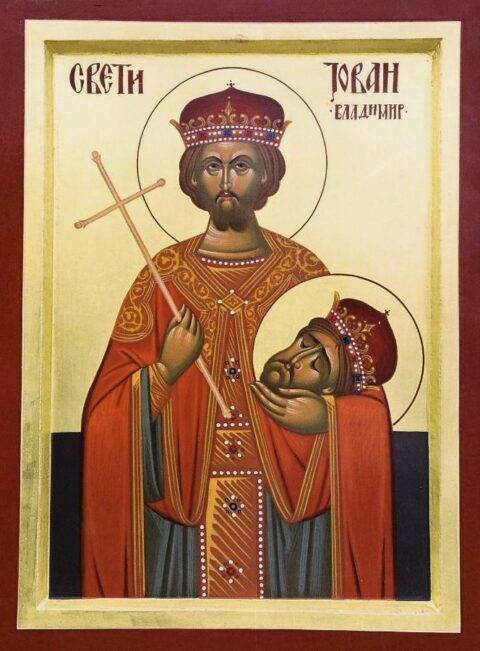
Calendar for June 4 - Holy Martyr John Vladimir, prince of Serbia
This holy and glorious Serbian king and wonderful martyr of Christ, John Vladimir, grew out of pious and imperial roots that ruled in the Serbian principalities of Zahumlje and Prevala (which were also called Dioclitija, Duklja or Zeta). His grandfather's name was Hvalimir and he had three sons: Petrislav, Dragimir and Miroslav. Petrislav took over Zeta (Duklja), Dragimir Travunija (Trebinje) and Hlevna (Hum), and Miroslav Podgorje. But Miroslav had no children, and his country came under the rule of Petrislav, who had his son, this blessed Vladimir, as his heir. And so Vladimir became king (in the second half of the tenth century) in Duklja and other regions of Illyria and Dalmatia, and his capital was near the Church of the Immaculate Virgin Mary in the region of Krajina (on the western side of Lake Skadar).
Blessed Vladimir was filled with spiritual gifts from childhood - he was meek, calm, silent, God-fearing and pure in life, scorning all the attractions of the earth and zealous for all that is sublime and divine. As the Byzantine historian Kedrin says about him, he was "a just and peaceful man and full of virtues". He is also praised by the ancient Slovenian chronicler Pop Dukljanin in his Chronicle called "Kingdom of the Slavs" (chapter 36). At an early age he spends some time with a good military leader to learn the art of war. Although he studied all this well, he combined chivalry and piety in himself, that is, true Christian piety. He also diligently studied the Holy Scriptures, and was very merciful to the wretched and the poor. With his knowledge of the Holy Scriptures and his charity, he managed to bring many Bogomils and other heretics back to the Orthodox faith. In his life and rule, he reasoned wisely in everything, and ruled his subjects wisely, which is why he was loved by everyone. In addition, he sent teachers throughout the nation to teach people the Orthodox faith and the doctrine of Christ, and to convert heretics to the Truth. And he also built churches and monasteries, as well as hospitals and asylums. In a word, he, although he was a king on earth and a powerful ruler, was a meek servant of the Heavenly King Christ and the Kingdom of God, which is not of this world, but for which this blessed one had already decided from childhood. That is why he would be honored, as we will see later.
Living so God-pleasingly, in constant and fervent prayers to God and charity, blessed King John Vladimir had difficult battles both internally and externally, internally with the heretics of God and externally with the conquerors: Tsar Samuel and Tsar Basil. Samuel, the Bulgarian emperor, went to war with a large army against the country of this blessed one and wanted to subjugate it to himself. The holy and Christ-loving King Vladimir, sparing human blood and loving peace more than war, removed himself with his people to the mountain called Oblik (or Kosogor). Having crossed the river Bojana and surrounded the city of Ulcinj, Samuel then also surrounded this mountain where the holy king was with his army. On that sloping mountain (= Kosogor) there were venomous and venomous snakes, and they caused great trouble to the army. Because if someone was bitten, he died immediately. St. Vladimir then prayed to God with tears that the almighty God would free his people from that pestilential death. And God heard the prayer of His servant, and the snakes stopped biting, and from then until now they do not bite anyone, and if they do bite someone, nothing will happen to them. However, Tsar Samuel sent a messenger to King Vladimir to come down from the mountain with all who were with him, but the king did not do so. Then the prince of that place was found as a traitor to Judah, who betrayed the innocent king to King Samuel, and the latter captured him and sent him to prison. And before his capture, King Vladimir gathered all his people around him and began to speak to them like this: It seems to me, brothers, that I am about to fulfill that word of the Gospel that says: A good shepherd lays down his soul for his sheep. It will be better, therefore, that I myself lay down my soul for all of you and that I willingly hand over my body to be killed, than that you perish by hunger and by the sword. Having said that, he said goodbye to everyone and went to the emperor, who sent him bound to his capital city of Prespa (near Ohrid) to be imprisoned. Samuilo then attacked the cities of Kotor and Dubrovnik with his army, conquered them and burned them, and with his army he enslaved and conquered Bosnia and Raška, then returned home with a rich booty. Calendar for June 4
Holy Martyr John Vladimir, prince of Serbia
This holy and glorious Serbian king and wonderful martyr of Christ, John Vladimir, grew out of pious and imperial roots that ruled in the Serbian principalities of Zahumlje and Prevala (which were also called Dioclitija, Duklja or Zeta). His grandfather's name was Hvalimir and he had three sons: Petrislav, Dragimir and Miroslav. Petrislav took over Zeta (Duklja), Dragimir Travunija (Trebinje) and Hlevna (Hum), and Miroslav Podgorje. But Miroslav had no children, and his country came under the rule of Petrislav, who had his son, this blessed Vladimir, as his heir. And so Vladimir became king (in the second half of the tenth century) in Duklja and other regions of Illyria and Dalmatia, and his capital was near the Church of the Immaculate Virgin Mary in the region of Krajina (on the western side of Lake Skadar).
Blessed Vladimir was filled with spiritual gifts from childhood - he was meek, calm, silent, God-fearing and pure in life, scorning all the attractions of the earth and zealous for all that is sublime and divine. As the Byzantine historian Kedrin says about him, he was "a just and peaceful man and full of virtues". He is also praised by the ancient Slovenian chronicler Pop Dukljanin in his Chronicle called "Kingdom of the Slavs" (chapter 36). At an early age he spends some time with a good military leader to learn the art of war. Although he studied all this well, he combined chivalry and piety in himself, that is, true Christian piety. He also diligently studied the Holy Scriptures, and was very merciful to the wretched and the poor. With his knowledge of the Holy Scriptures and his charity, he managed to bring many Bogomils and other heretics back to the Orthodox faith. In his life and rule, he reasoned wisely in everything, and ruled his subjects wisely, which is why he was loved by everyone. In addition, he sent teachers throughout the nation to teach people the Orthodox faith and the doctrine of Christ, and to convert heretics to the Truth. And he also built churches and monasteries, as well as hospitals and asylums. In a word, he, although he was a king on earth and a powerful ruler, was a meek servant of the Heavenly King Christ and the Kingdom of God, which is not of this world, but for which this blessed one had already decided from childhood. That is why he would be honored, as we will see later.
Living so God-pleasingly, in constant and fervent prayers to God and charity, blessed King John Vladimir had difficult battles both internally and externally, internally with the heretics of God and externally with the conquerors: Tsar Samuel and Tsar Basil. Samuel, the Bulgarian emperor, went to war with a large army against the country of this blessed one and wanted to subjugate it to himself. The holy and Christ-loving King Vladimir, sparing human blood and loving peace more than war, removed himself with his people to the mountain called Oblik (or Kosogor). Having crossed the river Bojana and surrounded the city of Ulcinj, Samuel then also surrounded this mountain where the holy king was with his army. On that sloping mountain (= Kosogor) there were venomous and venomous snakes, and they caused great trouble to the army. Because if someone was bitten, he died immediately. St. Vladimir then prayed to God with tears that the almighty God would free his people from that pestilential death. And God heard the prayer of His servant, and the snakes stopped biting, and from then until now they do not bite anyone, and if they do bite someone, nothing will happen to them. However, Tsar Samuel sent a messenger to King Vladimir to come down from the mountain with all who were with him, but the king did not do so. Then the prince of that place was found as a traitor to Judah, who betrayed the innocent king to King Samuel, and the latter captured him and sent him to prison. And before his capture, King Vladimir gathered all his people around him and began to speak to them like this: It seems to me, brothers, that I am about to fulfill that word of the Gospel that says: A good shepherd lays down his soul for his sheep. It will be better, therefore, that I myself lay down my soul for all of you and that I willingly hand over my body to be killed, than that you perish by hunger and by the sword. Having said that, he said goodbye to everyone and went to the emperor, who sent him bound to his capital city of Prespa (near Ohrid) to be imprisoned. Samuilo then attacked the cities of Kotor and Dubrovnik with his army, conquered them and burned them, and with his army he enslaved and conquered Bosnia and Raška, then returned home with a rich booty.
Blessed Vladimir sat like that in the dungeon in Prespa and prayed to God day and night. There, an angel of God appeared to him and strengthened him and told him that God would soon release him from prison, but that after that he would become a martyr and receive the unfading crown of eternal life in the Kingdom of Heaven. And the Macedonian emperor Samuilo had a daughter named Kosara, also called Theodora, who, inspired by the Holy Spirit, had great mercy towards the poor and slaves, and often visited the dungeons and comforted the slaves. She begs her father for permission to go down to the dungeon with her girls and wash the feet of the slaves, which her father allows. But Kosara, seeing Vladimir, blossoming as a young man, humble and modest, and full of the wisdom and understanding of God, loved him with her heart. They fell in love with him not out of lust, but because they felt sorry for his youth and beauty, and because they wanted to free him from prison. Kosara went before her father and asked him to give her this slave as her husband. The father could not refuse his daughter, because he loved her very much and knew that Vladimir was of royal blood, so he fulfilled her request and took Vladimir out of the dungeon. Samuilo gave Vladimir Kosar as a wife and restored to him the entire state, the kingdom of his fathers, and also gave him the land of Dyrachia (Dracka), and sent him off with honor and many gifts. Samuilo also restored to Vladimir's uncle Dragomir his land in Trivunija (Trebinje).
Blessed King Vladimir, arriving at his home with his wife Kosara, would be welcomed by his people with great joy. And from then on, he lived with Kosar in a holy and chaste way. Because he advised his wife to keep virginity, since virgins, he said, are similar to Angels. And the all-wise Kosara obeyed him, and lived in all wisdom and every virtue, loving God and serving Him day and night. And he reigned over the people entrusted to him with the fear of God and justice.
At that time, the Greek autocrat Vasilije II of Macedonia (976-1025) marched with a large army against the Bulgarian emperor Samuel and in the gorges of Mount Belasica terribly defeated his army (in 1014). Due to great sadness and mourning for the army, Samuilo died in a short cut, and Emperor Vasilije came all the way to Ohrid. Samuil's empire was inherited by his son Gavrilo Radomir, but less than a year later he was killed by Jovan Vladislav, his brother Stricevic. And that was also family revenge, because Vladislav's father Aaron had been killed earlier on the orders of his brother Samuil. The Greek emperor Vasilije then went to Vladislav, wanting to completely subjugate the former empire of Samuel. On the other hand, the cunning usurper Vladislav tried to deceive and kill the blessed King Vladimir.
One day Saint Vladimir went out into the forest near the city with three of his nobles, and they saw an eagle circling in the forest, and on his shoulders the venerable Cross shone as bright as the sun. Then the eagle laid the Cross on the ground and became invisible. The blessed king then got off his horse and bowed to the Cross of Christ and the Lord crucified on it, and then ordered that a church be built on that spot; he also made a big contribution. When the church was built, then this Holy Cross would be placed in it, and there the holy king went day and night for prayer and all-night vigils. Because he felt that the time was approaching to receive the martyr's crown, which he himself longed for so much.
And Vladislav, the murderer of his cousin Radomir, Kosara's brother, envying the holy king, and in his love of power wanting to get hold of Vladimir's kingdom as well, decided to kill him by deception. That's why he invited him to Prespa for an alleged agreement. Not believing in the sincerity of her uncle and sensing some kind of prank, the wise Kosara begged her husband to be the first to go to the agreement, in order to save blessed Vladimir from an unjust murder. But the cunning Vladislav deceived his sister as well, and sent a golden cross to the holy king by emissaries, inviting him to come and promising him that nothing bad would happen to him. The deluded Kosara could not recognize the honey-coated knife. And the holy king answered Vladislav: We know that our Lord Jesus Christ, Who suffered for us, was not crucified on a golden or silver Cross, but on a wooden one. If, therefore, your faith is true and your words are true, send me a wooden Cross through holy men, and on faith in the name of our Lord Jesus Christ, trusting in the Life-giving Cross and the Sacred Tree, I will come. Then the perfidious and cunning Vladislav called two bishops and a hermit, and pretending to think honestly before them, he gave them a wooden cross and sent them to the king. The holy king then set out on his journey, and accompanied by the Angel, he approached Vladislav's court. Along the way, he constantly prayed to God and, as the Dukljanin says in his Annals, stopping at a church, he confessed and received communion with the Holy Body and Blood of Christ.
Having passed through all the ambushes of Vladislav, the holy king finally arrives in Prespa. When Vladislav saw him coming towards him, he rushed at him and struck him with his sword, but did not harm him. However, Vladimir was not afraid and said: You want to kill me, brother, but you can't! So he pulled out his sword and gave it to him, saying: Take it and kill me, I am ready to die like Isaac and Abel. And Vladislav, darkened in mind, took a sword and cut off the head of the holy martyr. The saint took his head in his hands, got on his horse and rushed to the mentioned church. And when he arrived at the church, he got off his horse and said: Into Your hands, Lord, I entrust my spirit! And the murderer was ashamed and frightened by such a glorious miracle, so he ran away with his people. And so blessed John Vladimir received the martyr's wreath and changed the earthly kingdom for the Heavenly Kingdom, on May 22, 1015".
Bishops and clerics took the honorable body of the holy king Martyr and buried it with songs and hymns in the same church near Prespa Jezera, with great weeping and wailing of his wife Kosara. The Lord, wanting to publicize the merits of the blessed martyr Vladimir, made many who came to his grave in the church and prayed, received healing. And on the first night, many people saw a miraculous divine light on the tomb of King Martyr, like when many candles are burning. This scared the Bulgarian emperor, and he allowed Kosara to take the saint's body and carry it wherever he wanted. And she took the body of the holy king and took it to the place of his rule, Krajina, and honorably laid it in the church of the Most Holy and Pure Mother of God, the Virgin Mary. There the holy body of the King Martyr lay whole and incorruptible, emitting a wonderful fragrance as if it had been anointed with many aromas, and in his hand he held the Cross that he had received from the emperor. Every year on his feast day, May 22, a great number of people gathered in that church, and thanks to his merits and intercession, many miracles happened to those who prayed with a pure heart. And his honest wife Kosara, because of the sincere love she had for her holy husband, became a monk at that church and spent the rest of her life in piety and holy living. When she died, she would also be buried in front of her husband's feet.
However, Vladislav the killer hoped to maintain his Bulgarian empire and to add the Serbian one to it, so he came to Durrës with his army and besieged it dangerously. But, he was defeated there by the innocently shed blood of St. Vladimir, and he died during the aforementioned siege of Durres in early 1018, depriving himself of both temporary and eternal life. According to Dukljaninov, he was then approached by an armed soldier with the image of St. Vladimir.
And when he started shouting and running away, the Angel defeated him, and he collapsed and died both in body and spirit. And the Greek emperor Vasilije II easily captured Ohrid and Durres and returned victoriously to Constantinople.
The holy relics of the holy martyr of Christ, the righteous king of Serbia Jovan Vladimir, were after two centuries (around 1215), during the time of the pious Serbian king Stevan the First Crowned, first transferred to the city of Durres, which is why the saint is also celebrated as the patron saint of Durres, and some later they were transferred to his monastery of St. John (Albanian: Šin-Đon) near the city of Elbasan in central Albania. Since then, in this monastery, dedicated to the holy Martyr King (and according to tradition, the holy King himself built an endowment-church dedicated to the Holy Mother of God there during his lifetime), every year on his feast day a mass of faithful people gathered, and to the prayers of the Saint, many healings and received bounties. And all the Orthodox people, both Serbian and Greek and Albanian, called the holy Martyr a miracle worker and myrrh-bearer. The church where the Saint's relics rest was rebuilt from the ground up in 1381 by the Albanian prince Karlo Topija, a blood relative of the King of France, about which there is a record on the church itself (in Greek, Latin and Serbian). The Life and Service of the Holy Martyr King were soon written, first in Serbian, and then in Greek. This is what the publisher of the Greek Service ("Akolutija") and Life (Synaksar) of the Saint, Jovan Papa, a native of the city of Neocastro (ie Elbasan), spoke about when he printed it in Venice in 1690. But since the Serbian Service and Lives were somehow lost, the Hilendar Hieromonks and Prohigumen of Mount Athos, Luke and Parthenius, translated them from Greek again into Serbian, and with corrections and additions (especially in the Lives) by the Trieste parish priest and the famous hagiographer Vicenti Vakić, that is printed in 1802. in Venice, Hadži-Teodor Mekša, a merchant from Trieste. From here, Metropolitan Mihailo of Belgrade brought the Service and Life of St. King Vladimir to Srbljak in 1861. In 1925, a church was built for this crowned Martyr of Christ near the monastery of St. Naum, on Lake Ohrid, as the founder of this famous monastery.
May the All-Merciful God, through the holy prayers of this Martyr and Miracle Worker of His, look upon His people and upon His heritage, and put an end to the tortures and deliver us from our visible and invisible enemies. May God be glorified in the Trinity: Father, Son and Holy Spirit, the Trinity, one and indivisible, forever and ever. Amen.
Holy Martyr Basilisk. Memorial of the Second Ecumenical Council. Holy righteous Melchizedek, king of Salim
PHOTOS
RELATED ARTICLES
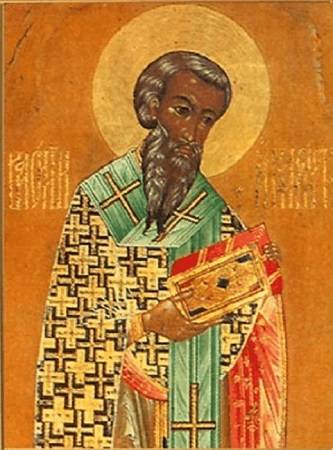
Calendar for May 9 His Homilist Basil of Amasia
Licinius, the son-in-law of Emperor Constantine, whose sister he had married,...
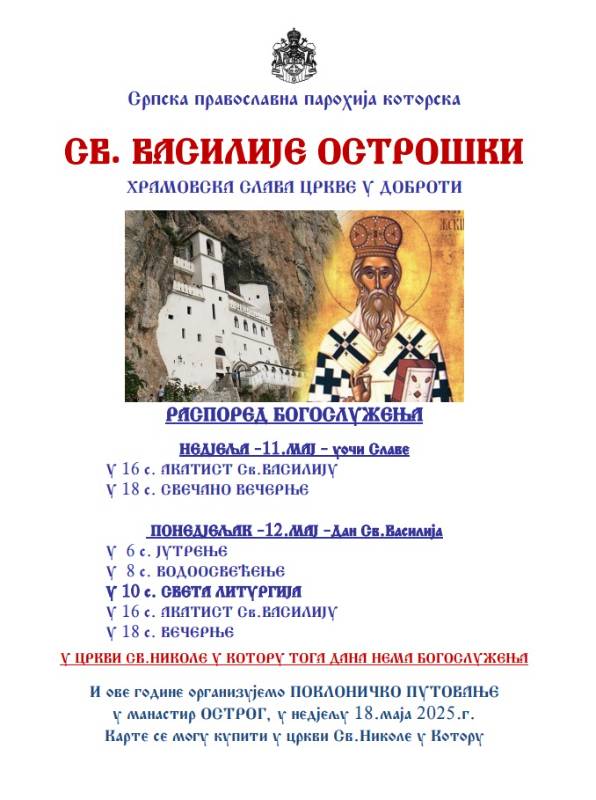
WORSHIPS ON THE OCCASION OF ST. VASILIJE OSTROŠKI
SERBIAN ORTHODOX PARISH OF KOTOR ANNOUNCES WORSHIPS ON THE OCCASION OF ST....
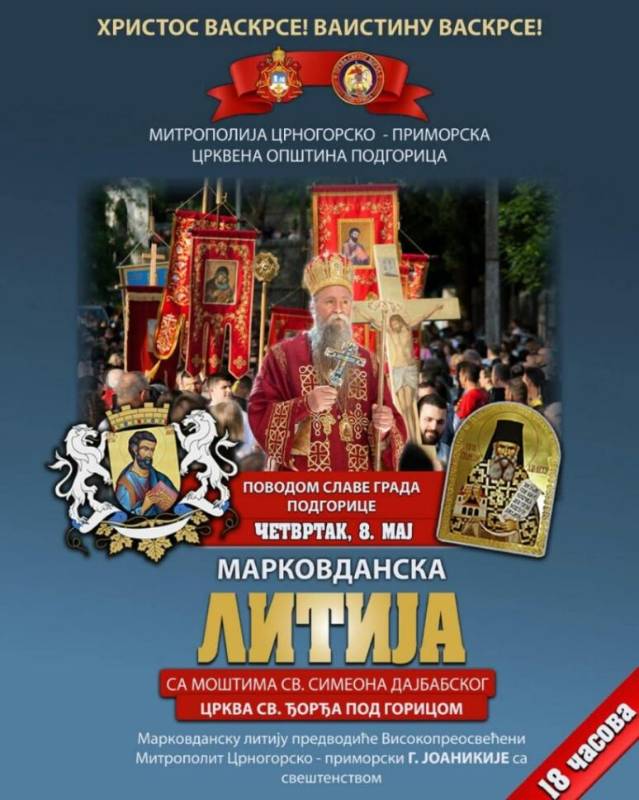
St. Mark's Day procession in Podgorica
On the occasion of the celebration of the city of Podgorica, the...


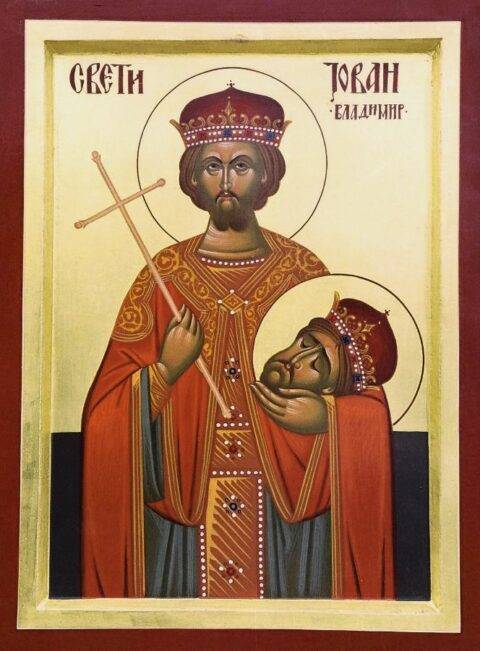

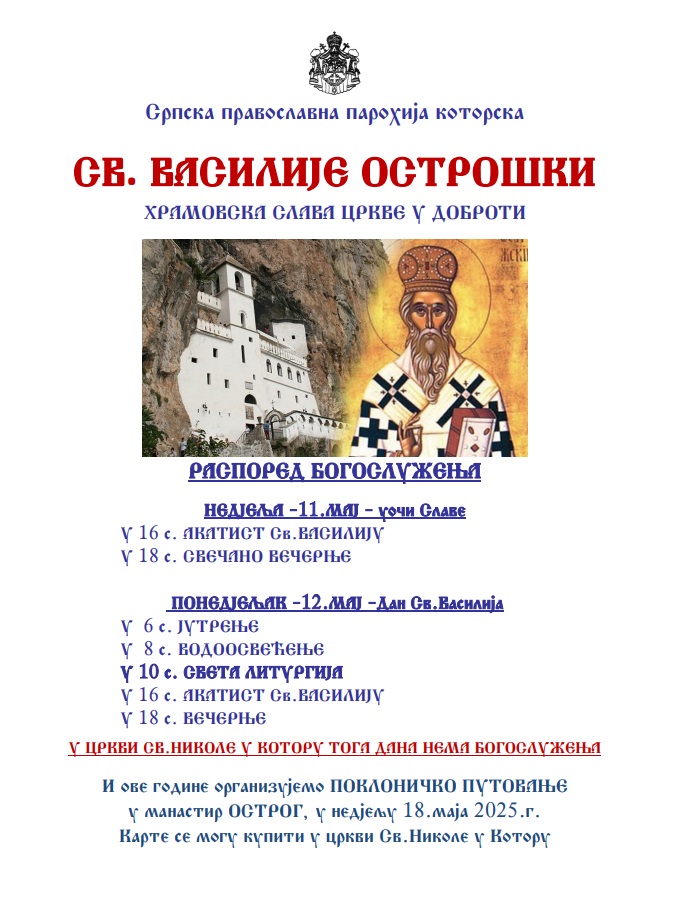
.png)